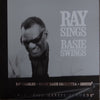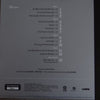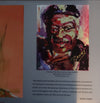







Ray Charles + Count Basie Orchestra – Ray Sings Basie Swings (2LP, Half-speed mastering, Number 0871)
Rarity sealed
Vocals, piano - Ray Charles (A1 to D2)
The Count Basie Orchestra:
- Conductor - Shelly Berg (A3, B1-2, C1-3, D1), Tom Scott (A1-2, B3, D2)
- Lead alto saxophone, flute - Marshall McDonald
- 2nd alto saxophone - Grant Langford
- 1st tenor saxophone - Doug Lawrence
- 2nd tenor saxophone - Doug Miller
- Baritone saxophone - John Williams
- Lead trombone - Dave Keim
- 2nd trombone - Clarence Banks
- 3rd trombone - Alvin Walker
- Bass trombone - Barry Cooper
- Lead trumpet - Mike Williams
- 2nd trumpet - Scotty Barnhart
- 3rd trumpet - Shawn Edmonds
- 4th trumpet - Endré Rice
- Organ - Joey DeFrancesco
- Piano - Tony Suggs
- Double bass - James Leary
- Guitar - Will Matthews
- Drums - Butch Miles
- Backing vocals - Patti Austin, Maxi Anderson, Lynne Fiddmont, Lorraine Perry, Sharon Perry, Darlene Perry,Valerie Pinkston, Sandy Simmons
Additional musicians - Wayne Bergeron, Chuck Berghofer, Jim Cox, John Chiodini, Andy Martin
Arranged by Tom Scott (A1, D2), Roger Neumann (A1), Quincy Jones (A2, B4), John Clayton (A2), Larry Muhoberac (A3), Shelly Berg (A3, B1-2, C1-3, D1), Gregg Field (B4)
Written by Oscar Hammerstein II, Richard Rodgers (A1), Fleecie Moore, Sam Theard (A2), George & Ira Gershwin (A3), Silas Hogan, Jerry West (B1), Harlan Howard (B2), Buck Owens (B3), Don Gibson (B4), Boudleaux Bryant, Felice Bryant (C1), James Johnson, Leslie Temple (C2), John Lennon & Paul McCartney (C3), Melanie Safka (D1), Hoagy Carmichael, Stuart Gorrell (D2)
1 LP, standard sleeve
Limited numbered edition (Number 0871)
Original analog Master tape : YES
Half-speed Mastering
Heavy Press : 180g High Quality Vinyl
Record color : black
Speed : 33RPM
Size : 12”
Stereo
Studio
Record Press : Record Technology Inc.
Label : Pure Audiophile Records
Original label : Concord Records
Recorded February - May 2006 at Conway Studios, Capitol Studios, G Studio Digital
Engineered by Bill Airey Smith, Charles Paakkari, Seth Presant, Steve Genewick
Produced by Gregg Field, Dennis Cassidy
Executive-Producer - Mike Crane
Half Speed Mastered by Stan Ricker at Stan Ricker Mastering
Originally released in October 2006 (as a CD)
Reissued 2007
Tracks :
Side A:
1. Oh, What A Beautiful Morning
2. Let The Good Times Roll
3. How Long Has This Been Going On?
Side B:
1. Every Saturday Night
2. Busted
3. Cryin' Time
4. I Can't Stop Loving You
Side C:
1. Come Live With Me
2. Feel So Bad
3. The Long And Winding Road
Side D:
1. Look What They've Done To My Song
2. Georgia On My Mind
3. Them That Got - The Count Basie OrcHestra
Reviews :
"Ray Sings, Basie Swings, huh? Hmm, well, yes and no. You see, the story goes something like this. In 2005, Concord Records exec John Burk, who produced Ray Charles' superb late-career, Grammy-winning Genius Loves Company, found a reel of tape simply labeled "Ray/Basie." Upon further analysis, it was determined that the 1973 recording featured Ray Charles backed by his own band -- Count Basie and his band had actually recorded earlier that day. Charles' vocal was exceptionally prominent in the mix and at first it was thought that this potentially momentous discovery would prove unable to bear fruit. But then Burk brainstormed and decided to bring the current Count Basie Orchestra -- whose leader died in 1984 -- into the studio to lay tracks behind Charles' vocals. So there's no Basie on Ray Sings, Basie Swings, but that's merely a technicality, because there is some great music. Charles was in fine form vocally on this mix of remakes of his early ABC-Paramount-era hits and then-recent material. The consecutive reworkings of "Busted," "Cryin' Time," and "I Can't Stop Loving You," three of his defining Top Ten hits of the early '60s, are given brassy, bluesy treatments here, and standards ranging from Oscar Hammerstein II's "Oh, What a Beautiful Morning" to the Beatles' "The Long and Winding Road" are transformed in Charles' hands. The set-closing "Georgia on My Mind," as close to a signature song as Charles had, is given a tender, minimalist reading, but the track preceding it, "Look What They've Done to My Song, Ma," picked up from the folk-pop singer Melanie, is quite possibly the album's highlight. It's appeared on other Ray Charles compilations before, but the gospelized, testifyin' version featured here has got to be the liveliest take on that song anyone's ever devised. So, yeah, there's no Count Basie to be found here, but his namesake orchestra does him proud. For one of those postmortem studio patch jobs that owes as much to technology as talent, it's a fine addition to the Ray Charles oeuvre, as long as one can get past the semi-false advertising of its title." Allmusic review by Jeff Tamarkin
Half-speed mastering
In half-speed mastering, the whole mastering process is slowed down to half of the original speed. A typical 33 1/3 rpm record is cut at 16 2/3 rpm. The source material is also slowed down (reducing the pitch in the process) meaning the final record will still sound normal when played back. Slowing the whole process down allows more time, which means the end result sounds better and is more efficient — allowing engineering to minimize the effects of inherent limitations within the vinyl format. The result is a more accurate and more open high-frequency response in the half speed vinyl when compared with a normal speed recording.
Ratings:
AllMusic : 3.5 / 5 ; Discogs : 4.57 / 5




